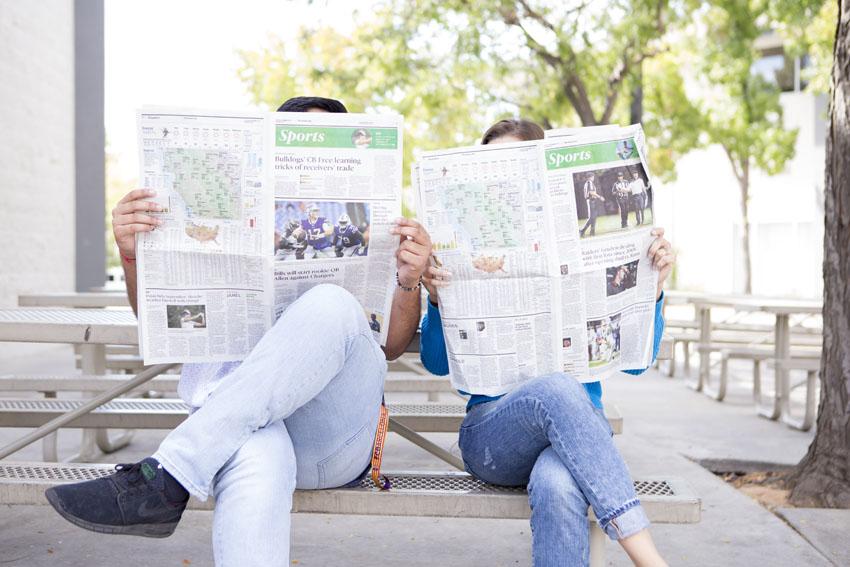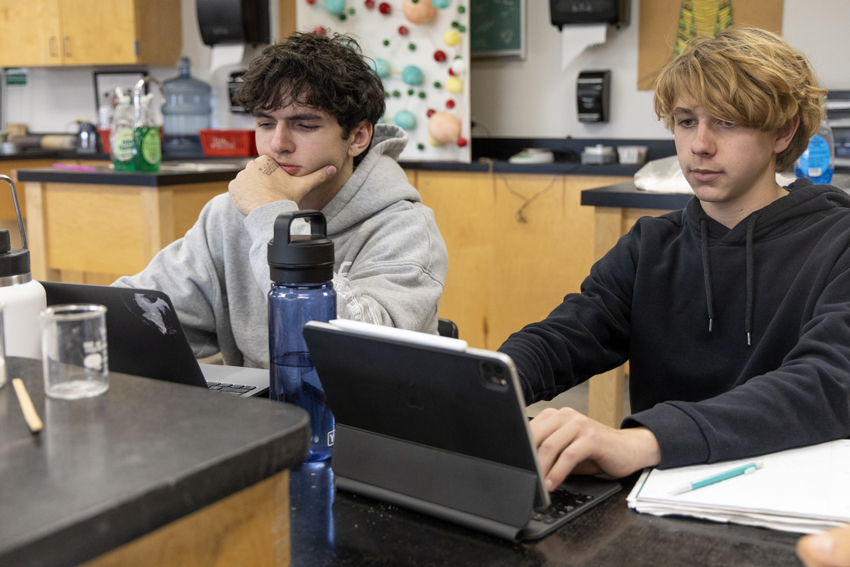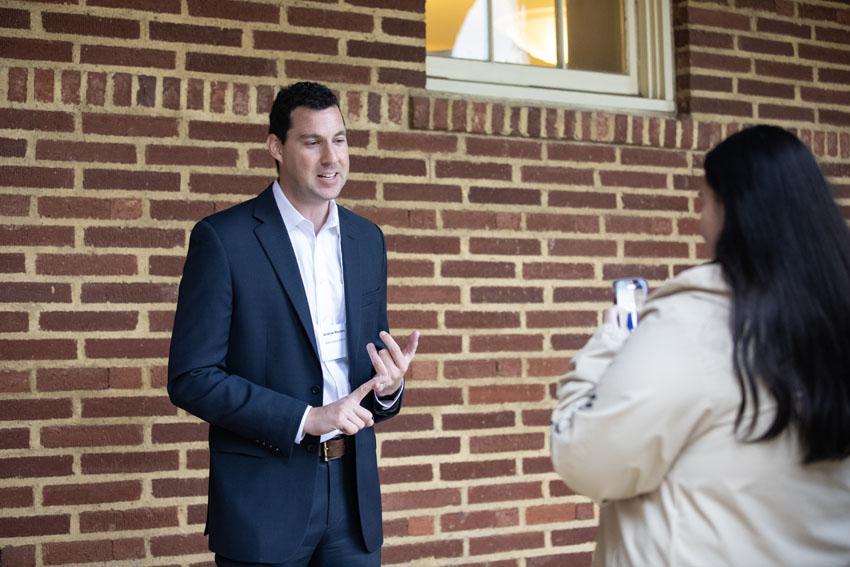Fake news leads to media literacy education

Throughout 2020, the struggles of Covid-19 forced many businesses to shift their workforce to online platforms. Whether through Zoom, Webex or Microsoft Teams, many employees found themselves spending more time at their computer than ever before. With this rise in screen time, the importance of an understanding of media literacy grew to an all-time high.
Dictionary.com defines media literacy as ‘the ability or skills to critically analyze for accuracy, credibility, or evidence of bias the content created and consumed in various media, including radio and television, the internet, and social media.’
While media literacy has become the primary term in most industries, Professor Frank LoMonte, Director of the Brechner Center for Freedom of Information prefers a different phrase in a telephone interview, March 31.
“I actually don’t like the term media literacy,” Professor LoMonte said. “I try to avoid using it because, first of all, it feels a little bit pejorative to me to tell a whole cohort of people that they’re not literate yet. I actually like to use the term media mastery and not media literacy. When I talk about what we’re aspiring to I like to talk about mastery and not literacy.”
Regardless of preference between mastery or literacy, the term’s relevance has risen in the last decade. This stems from the growing issue of fake news and misinformation online.
In October of 2020, in the heat of the presidential election, the New York Times published an article addressing the fake news issue on Facebook. The article reported an increase in interactions with Facebook pages known to publish misinformation tripled since the 2016 election. This rise in fake news became a factor in Poynter Institute founding their MediaWise project in 2018.
This organization aims to educate millions of American teenagers on how to sort facts from fiction online. As a multimedia reporter with MediaWise, Alexa Volland was inspired to pursue a career in journalism after witnessing the surplus of misinformation during the 2016 election.

Now, as a part of MediaWise, Volland has learned a variety of strategies to combat the dangers of misinformation. In an April 5 interview, she talked about the presence and dangers of an ‘echo chamber’.
“The media literacy tip you can bring in is to examine and realize your echo chamber and take actions to get out of it,” Volland said. “When I say echo chamber, that’s when you’re only reading news opinions and surrounding yourself with views and worldviews that are the same as your own. It can be really hard to realize we’re in contact with misinformation because it can be hard to look at facts that oppose our own world view.”
While fake news and misinformation appear to be modern issues, these struggles have persisted for decades. John Culkin became the original pioneer for the media literacy movement in the 1960s and pushed teachers to educate students about media literacy. As the founder of the Center for Understanding Media, Inc. Culkin describes his purpose in this excerpt from 1964.
“The attainment of [media] literacy involves more than mere warnings about the effects of the mass media,” Culkin wrote. “And more even than constant exposure to the better offerings of these media. This is an issue demanding more than goodwill alone; it requires understanding. And training in understanding is the task of the school!”
In the following podcast, Professor Frank LoMonte discusses with Kyle Clem the importance of media literacy and his tips to discern misinformation via telephone, March 31.
Campus English teacher Andrea Donaghe acknowledges a teacher’s role in educating their students to become media literate. In her classroom, Donaghe assigns activities that teach her students to develop their media literacy understanding.
“It’s important to be able to see both sides of an issue, you might actually learn something,” Donaghe said. “Every Monday is ‘Media Monday’ in my class, which allows students to research and read something that has been published online about local, state, national, political or world affairs. It’s important for students to be media literate so they are able to decipher between the truth and falsehoods of what they are being presented with.”
Beginning May 10, MediaWise begins the United Facts of America event, highlighting fact-checking across the internet.
Today’s the first day of United Facts of America! Register now and join the conversations starting this afternoon. https://t.co/q3zhhHJkiT
— MediaWise (@mediawise) May 10, 2021
While most students encounter the concepts of media literacy in high school, many remain unaware of the term. Cohl Obwald, ’21, falls into this group. However, after learning the meaning of the word, Obwald recognizes the value of having a media literacy understanding.
“I have no idea what media literacy means,” Obwald said. “If I had to guess, something with the media and news or how to write articles and put that together. I think media literacy’s important because then you can actually tell what’s real and what’s fake. Obviously, fake news is a real thing that’s been going on so it’s important to be able to decipher what’s real and what’s actually happening around us.”
In comparison, Mackenzie Beckworth, ’21, had heard of the term in the past and recognized its importance in this day and age. Beckworth believes a media literacy education provides people with the freedom to formulate their own opinions free of bias.

“It’s just being smart and thorough enough to filter through preconceived notions that are being proclaimed in the media and to search out the truth for yourself.,” Beckworth said. “It’s so important for everyone to possess this skill because every person deserves to have the confidence to find out the truth for themselves and not rely on the flimsy opinions of people.”
Former Fresno Bee editor, Jim Boren, witnessed the rising importance of media literacy in the modern-day firsthand. Now, as the Executive Director of the Fresno State Institute for Media and Public Trust, Boren believes an understanding of the need and role of media literacy has become essential in the modern world.
“First we need to understand the need for media literacy and understand the basic role of media literacy in our society,” Boren said. “There’s a lot of people that pass on misinformation but they’re not doing it for nefarious purposes. Then there are others who pass on disinformation trying to manipulate you. You have to understand that you don’t click on the first thing that you see.”
Whether information, misinformation or disinformation is encountered, a few key strategies can be used to sift through untruths and find facts. One such tip, developed by the Stanford History Education Group, involves three steps to uncover misinformation. Alexa Volland recognizes these steps as a key element in filtering out fake news and exaggerated headlines.
“No. 1: Who’s behind the information,” Volland said. “Do they seem overtly biased, then maybe avoid them as a source. No. 2: What is the evidence? I see this all the time on Instagram where there will be no source of information. No. 3: What are other sources saying? You want to make sure you’re reading a few articles from reputable sources and make sure they’re all reporting the same thing.”
In the following Tweet, the MediaWise team showcases three main questions to spot misinformation online.
The @mediawise Teen Fact-Checking Network encourages teens to ask themselves three questions to help spot online misinformation:
? Who was behind the information?
? What’s the evidence?
? What are other sources saying? https://t.co/QgL2tfOQIq— WBUR (@WBUR) August 12, 2020
Another method involves a daily consumption of news from a high-quality, trustworthy source. Professor LoMonte recognizes a connection in importance between a morning exercise routine and a daily news intake from reputable sources such as ProPublica.
“It would be great after you roll out of bed and do your treadmill,” Professor LoMonte continued. “If you get on your phone or your iPad and spend 15-20 minutes engaging with something. One of my favorites is ProPublica. It’s a nonprofit news organization that is staffed by some of the best trained, best-qualified journalists in America cranking out high-end investigative reporting every day of the week.”
The following tweet from the AllSides balanced news team illustrates levels of media bias from a variety of major news sources.
News reports on today’s elections may differ throughout the political spectrum. You need to make sure you’re seeing the full picture.
Get news from all sides of the media with the latest edition of our Media Bias Chart:#MediaLiteracy #MediaBias https://t.co/QdM9riclOR pic.twitter.com/IbGTstYeBn
— AllSides (@AllSidesNow) November 3, 2020
While fake news and misinformation tactics continue to evolve into the future, a media literacy education becomes even more important than ever. A 2018 New York Times article by Austan Goolsbee titled ‘What Advertising History Says About the Future of Fake News’ summed up the problem best.
“Fake news and microtargeting can be combined to create a kind of advertising that’s like an evil version of Reese’s Peanut Butter Cups, and we are being exposed to more of these pernicious morsels every year.”
Check out the following video to hear the full conversation with Alexa Volland on the value of media literacy.
What steps are you taking to help enhance your media literacy skills? Leave a comment down below and let us know.
For more articles read Media literacy aids students in analyzing news, social media or LRC Instructor Kimberly DeWolf continues to assist students after 25 years.
Kyle Clem can be reached via Twitter: @KyleClem21 or via email.





Serenity Cortez • Sep 3, 2021 at 8:15 am
Great article!
Brooke Stobbe • May 15, 2021 at 1:31 pm
Media literacy is about knowing who to trust and where to get your information. Not only that, but how the authors of your information alter the way you perceive it. From elections to vaccines, policy and education, it completely alters communities and the way we think.
Thanks for continuing to talk about this important issue! It’s not going away, so it’s integral to keeping it present in the conversation.
Marshall Goldsborough • May 14, 2021 at 12:06 pm
Very cool article 10/10
Emma • May 14, 2021 at 10:07 am
Amazing and informative article
Aubrey Graham • May 14, 2021 at 10:06 am
amazing article Kyle!!
Jim Boren • May 14, 2021 at 8:46 am
Thanks for highlighting the importance of media literacy in this comprehensive article. Here is a link to a blog at the Institute for Media and Public Trust at Fresno State that offers 8 tips for identifying phony news content: https://mediaandpublictrust.com/2021/03/25/weve-compiled-8-tips-for-identifying-false-content-that-you-may-encounter-on-the-internet-use-them-to-be-a-smart-media-consumer/